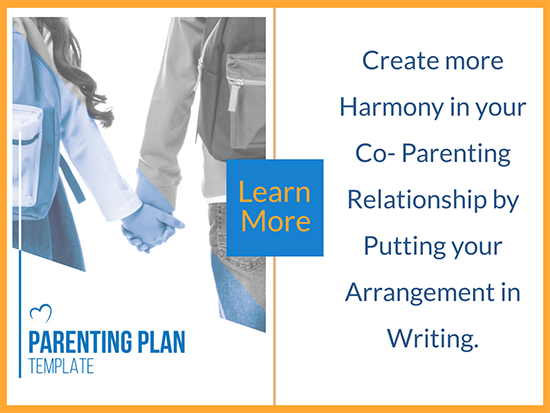If you’ve separated from your partner who you have children with, a well-designed parenting plan will make things so much easier for everyone involved – even if you separated a while ago.
If you’re not already familiar with parenting plans, they refer to the mutually-agreed-upon document written up by a child’s parents and/or their legal representatives, which formally documents the parenting arrangements for children after their parents divorce or separate.

A parenting plan usually outlines things like:
- the living arrangements for the kids involved and time spent with each parent,
- how the family communicate with each other,
- who pays what for the children (school fees, medical, child maintenance etc) and
- where holidays and other significant events will be spent.
In fact, a parenting plan can outline just about anything involving the care of shared children. As you can imagine, this document can prevent many unnecessary arguments, make things more stable for the whole family and create greater co-parenting harmony..
Why not just have a verbal parenting agreement?
Sure, you can have a verbal parenting plan, but these types of agreements don’t usually last long before parents are arguing about who said what.
It’s far more reliable and peaceful to put your plan in writing. You can start with a DIY Parenting Plan Template, which includes all the common scenarios and which you can easily edit to suit your needs. Once it’s done, it’s signed and dated by all parties involved (often in the presence of official witnesses) and copies kept by each parent. This gives you and your children certainty and eliminates the ‘he said, she said’ nonsense you’d get from a verbal or informal arrangement.
Benefits of a clear parenting plan
The clarity that an official parenting plan is one of its greatest assets. Because a separation or divorce brings such upheaval and uncertainty into everyone’s lives – especially the children – it’s so important to set strong routines and boundaries.
It’s also vitally important to not expect the kids involved to make decisions about who they want to see and when, as being ‘caught in the middle’ can be highly damaging to their emotional wellbeing. The parents also experience less emotional pain if they can agree, have certainty and can plan their lives according to a schedule and don’t have to argue every point.
It might sound like a lot of work, but parenting plans can be very simple and as mentioned, can even be made using online DIY kits. Some of the many benefits to creating your own parenting plan include:
- Conflict between parents will be lessened.
- Parents have to work together, so will develop better negotiation skills.
- Less stress on your children and clear routines and expectations will improve their wellbeing.
- You know your children best, so you can be sure their interests are being put first.
- You can ensure your parenting plan is best suited to your family’s circumstances.
- There will be no confusion about which parent will be having which child and when, which means you’ll be able to plan accordingly.
- You’ll be better-able to budget, as you’ll know exactly when you’ll have your children.
- Parents can focus on parenting, rather than stressing out about what the other parent is doing.
- An effective plan can help settle kids down into their new situation.
Why a parenting plan is better – Shane’s Story
Shane* learned the hard way about not having a clear parenting plan when he and his wife split up early last year. Because their split had been somewhat amicable and his ex-wife had not wanted the primary care of their three young children, Shane assumed that their care arrangements would also be easy to manage.
Unfortunately, many fights erupted as a result of things like Shane’s ex-wife not turning up when she said she would, or suddenly turning up to pick up the kids for a weekend activity she had planned, without prior consultation with Shane. The many small squabbles turned into huge arguments and the children were frequently upset by the uncertainty of what was happening. Thankfully, Shane’s mother suggested a formal parenting plan, which outlined exactly when Shane’s wife would have the children and what each parent’s responsibilities were in regards to notifying each other of plans and who paid for what.
After the parenting plan was implemented, the fights stopped and the children’s care arrangements went smoothly. Shane noticed an almost immediate improvement in his children’s moods and behaviour and he and his ex-wife got along much better. Whenever any issues came up, Shane and his ex-wife would sit down (with the children, if needed) and peacefully negotiate new terms. The whole process was a win-win for everybody.
(*Name withheld to protect identity)
How much detail can I include in a parenting plan
A parenting plan can have as much or as little detail as needed to suit your family’s personal needs. The most important consideration though should focus on the childrens’ best interests, which means their security, happiness, health (physical and emotional) and development should be put before any of the parents’ needs.
There is definitely no one-size-fits-all plan and you may choose to have broad terms where smaller decisions can be negotiated day-by-day, or very detailed terms can be agreed upon about care, money, healthcare, education, grandparents, food or anything else that makes every point very clear or not negotiable. Having said that, it is always a good idea to try to remain somewhat flexible with your parenting plan and allow for spontaneity occasionally.
If both parents are open to negotiation, the easiest way to draft a parenting plan is to use a plan available to download online, such as our Parenting Plan template. Otherwise, you can consult with a community-based dispute resolution service or an independent legal professional for further advice.


